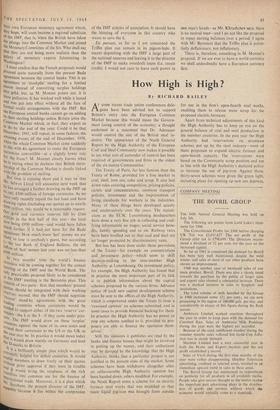The Battle for Sterling
By NICHOLAS DAVENPORT M. Monnet realises that a weak £ stands in the' way of our joining the Common Market and as article 108 of the Rome Treaty prescribes 'mutual aid' if a member country gets into balance of payments trouble he suggests that a European monetary fund should come to our help as soon as we sign (if we sign 'without conditions,' as General de Gaulle has said). The French are well aware that our present trading deficit will in the short run get worse if we have to lower our industrial tariffs and import dearer food on 'join- ing up,' but it will be in the interest of the Six to help the £ over the difficulty seeing that much of their currency reserves is in sterling. Devaluation of sterling would cost them a lot of money.
1 should explain that this new European moan' tary fund is not to be confused with the limited European Fund of the old OEEC, which been extending credits to a few countries Ilk' Spain, Turkey and Iceland. The fund which P.1. Monnet proposes is of a different order. Merry hers of the Common Market would be expected to contribute a fixed proportion of their gold and foreign currency reserves, and as these reserves increased last year by no less than $4,400 mil" lion the total fund could be quite substantial. It would be, expected to make substantial ioans to those • members who are in balance of pe ments deficit. M. Monnet, of course, regards his new monetary fund as a step towards his ()ilia' tive—a common European currency in a United States of Europe—and in five or ten years tirne I would not be surprised to see his dream realised. But there is more to his proposal than that. The French are opposed to the grandiose American plan for extending the role of the IMF and making it a credit-creating central bank 01 Professor Triffin's lines. They distrust an IMF dominated by American and British bankers; theY are merely prepared at this stage for a monetall association between the US and Europe through the mechanism of the new OECD which is to CO' ordjnate Western 'growth' policies and the provi' sion of Western aid for the underdeveloped call; tries; they are concerned only with the working ° THE SPECTATOR, JULY 14. 1961 their own European monetary agreement which, theY hope, will soon become a regional substitute of the IMF, that is, when the British have taken the plunge into the Common Market and joined the Monetary Committee of the Six. Who shall say that they are not being more realistic than the galaxy of monetary experts fulminating in , washington?
must confess that the French proposals would Proceed quite naturally from the present Basle agreement between the central banks. This is an agreement to 'stockpile' sterling for a limited season instead of converting surplus holdings into gold, but, as M. Monnet points out, it is hiere palliative. It has worked well while it lasted and was put into effect without all the fuss of formal credit arrangements with the IMF. But the European central banks cannot go on adding their sterling holdings unless Britain joins the '°Mmon Market which, in fact, they expect us to do by the end of the year. Could it be that becember, 1961, will repeat, in some fashion, the all,lazing events of the end of December. 1958, wilen the whole Common Market came suddenly In life with fin agreement to make the European currencies convertible—at a slightly lower rate 1,°r the franc? M. Monnet clearly.knows what iitse is saying When he declares that British mem- uership of the Common Market.is closely linked with the problem of sterling. But time is running short, and it may be that !qr. Selwyn Lloyd Will announce next week that IC has arranged a further drawing on the IMF up th°' say, £300 million of foreign currencies. As we "ave awonly' recently repaid the last loan and have dr; „ mg rights (including, our quota) up to nearly 00 million. this would be a,reasonable.request. 011r gold and 'currency reserves' fell by £164 tnillion in the first half of this year—the total new being E990 million—and would have fallen illuch further if it had: not been for the Basle ,4.g,reernent. How much more 'hot' money we are 11K, elY to lose is anybody's guess, but according i the last Bank of England Bulletin, the net nw of 'hot' money last year was no less than 'WO million.
two months' . time the world's finance oisters will be coming together for the annual nile,eting of the IMF, and the World Bank. The 7tnY Practicable proposal likely to be considered 'et the IMF meeting is the Bernstein plan. This nosists of two parts: first, that members present (Irlintas should be integrated with their working ceserves; second, that the IMF should negotiate itreverse' stand-by agreements with the great in8 countries whose currencies would be "receded to support either of the two, 'reserve' cur- s:cies—the E or the $—if they came under pres- _e. The IM F would draw an these 'surplus' `r_uu.ntries against the issue of its own notes and the lend their currencies to the US or the UK as the case may be. In practice it would mean today th!t it would draw mainly on Germany and lend v., 0-marks to Britain. exttt is a brilliantly simple plan which would be en enielY helpful for deficit countries. It would members to draw freely on their quotas wit members prior approval if they were in trouble it would bring the surpluses of the rich ries into common' use for the finance of liviniernational trade. Moreover, it is a plan which ti'Jacobson, the present director of the IMF, PP°rts because it lies within the competence of the IMF articles of association. It should have the blessing of everyone in this country who wants to save the E.
En passant, as far as I am concerned the Triffin plan can remain in its pigeon-hole. It meant depositing with the IMF a large part of the national reserves and leaving it to the director of the IMF to make overdraft loans (i.e. create 'credit). I would not care to leave such power in one man's hands—as Mr. Khrushchev says, there is no neutral man—and I do not like the proposal to repay sterling balances over a period. I agree with Mr. Bernstein that the Triffin plan is poten- tially deflationary, not inflationary.
There is, therefore, something in M. Monnet's proposal. If we are ever to have a world currency we shall undoubtedly have a European currency first.



































 Previous page
Previous page